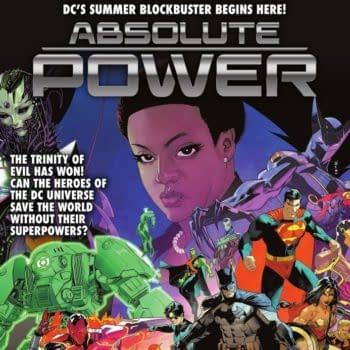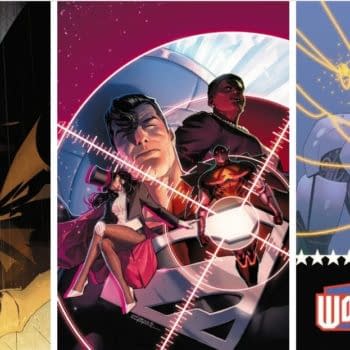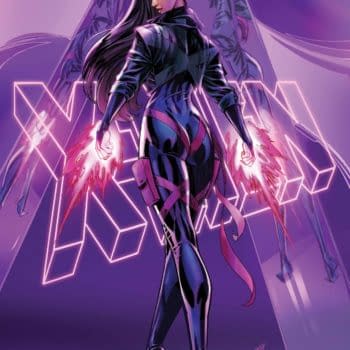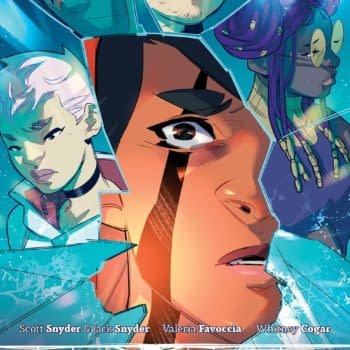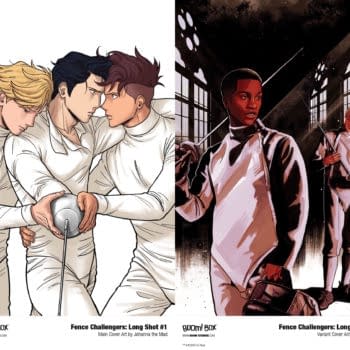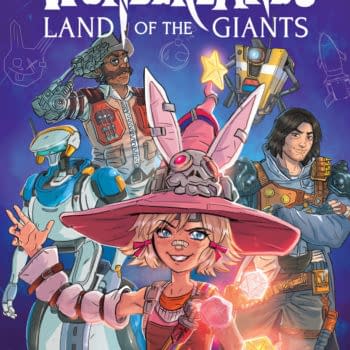Posted in: Comics, san diego comic con | Tagged: Comics, entertainment, LGBTQ
SDCC '15: Gays In Comics – 28 Years Later
By Joe Glass
Roger Klorese moderated another Prism Comics hosted LGBTQ panel, the annual Gays in Comics panel that has been running at San Diego Comic Con for an impressive 28 years. The original moderator was in fact in the audience, who had been involved in that very first panel way back in 1989. A longer panel than most, this panel ends with a silent auction raising funds for Prism, with amazing items kindly donated by a wide and varied range of supported, from DC/Vertigo to comic shops and creators.

The theme for this year's panel was intersectionality, how the many different and varying aspects and concerns of our lives, beyond just being LGBTQ, affect the person that we are.
Tran-Caffee briefly mentioned her webcomic, Failing Sky, is made up of all the daily experiences of life, just from a trans perspective. Andersen got a little emotional as he described how being a father, concerns of his children and wanting them not to be made to feel ashamed of him were especially important to him now, evident in latest release Super Boys Meet Baby. Likewise, his religion and issues around their persecutions of particular groups, especially queer and women, were important to him.
Price gave an interesting history of her work, and starting out in a time of veiled language, like working in a time of Don't Ask, Don't Tell, due to her working in a syndicated newspaper comic strip. However, she mentioned how this use of veiled language and vague but readable allegories actually appealed to a queer readership at the time, and it was like they found her. She elaborated on the difficulties of discussing relationships this created, and how it was a huge moment to realise that the 'goal posts had changed' as a recent strip featuring two women was neither balked at or broadcast by the editor or newspaper. What's more, there was no pushback at all, and in fact all responses had been positive.

It was at this point that Andersen brought attention to me in the audience. He mentioned my own work in LGBTQ comics, and our interview that recently had featured right here on Bleeding Cool, and we discussed the more emotional sides of making comics and loving what you do.
Klorese did wonder in fact if Andersen had faced any negativity from the Mormon church for his work Stripling Warrior, about an unashamedly gay, Mormon superhero. Andersen says he hasn't had too much, but feels like he knows it's coming. He's already felt he had to shut down comments on certain social media as he didn't want to put himself or his family through that, and also mentioned an example of negativity from a close friend, angry at him for 'attacking' the church. As Andersen points out, he's not out to bash the church, he just wanted to tell them to stop bashing him.
It was around here that Anka and Wada entered the panel and we returned to the discussion of intersectionality. For Wada, he finds an important factor in his work is how he represents women, and he tries to do it in a more sensitive way than is common in comics. Anka has noticed how, given his attraction to both genders, he can draw both genders as appealing. It's nice for him that people feel he is leaving no one out.
Klorese had in fact noticed how many straight male artists have a tendency to draw a weird idea of what they think women are attracted to in men. Anka feels it may be a fear of admitting personally what is attractive in another guy, and it causes some people to overcompensate in a bizarre way. Anka went on to discuss how he's looking forward to his upcoming work on Captain Marvel, as he can focus on one character rather than a whole group, and do things like give them a wardrobe with multiple outfits, and how he hopes to get to play with the relationships between Carol and Jess (Spider-Woman) and Rhodey (War Machine).
Andersen interjects to ask if he's had any negative feedback to the slight redesign he gave Carol for the new book, and Anka pointed out that for Carol, no, the response has been very positive, but his redesign of Dazzler actually led to death threats online.
We briefly saw a discussion of what were the first comic projects that the panelists worked on for themselves, with Braddock mentioning a little comic about a cowboy, and how when she showed it to another creator she met, the first thing they asked was why, as a woman, the lead character was a man. She realised there was an internalised homophobia she was operation under, fearing people wouldn't want to see the things she wanted to do. Whilst Price mentioned her story about her family visiting her while she lived in Dublin, and a case of mistaken identity between James Joyce and Elton John that saw her strip of this snapshot of maternal confusion published in a Dublin newspaper, the first of her work, it did lead to an interesting diversion as she, Braddock and Alison Bechdel once had a boob-drawing (after Price mentioned noticing walking around the show floor a large propensity for 'robust breasts') contest in a steakhouse, which Braddock assures she won.
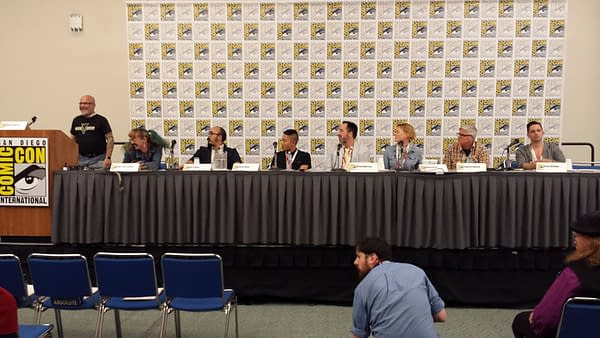
Klorese asked how Midnighter happened, and Orlando pointed out that as with anything in comics, it was a confluence of events and knowing the right people. When the now Bat-office editor asked what he'd like to do, Orlando immediately said Midnighter. Orlando loves the character, as he approaches life as Orlando does 'which is to say he has zero fucks to give'.
Returning to the discussion of first comics, Andersen discussed his partner recently finding his, redrawn Bazooka Joe comics with a cat character called Lockheed, which he loved but their kind of all stolen, so he figures he can't do anything with them. Wada said the first comic he ever did was for his highschool newspaper, which he wants everyone to forget he mentioned. Andersen asked Wada why he hasn't yet done interiors in a comic, and Wada joked how it's scary and it sounds like hard work, so why would he.
Anka never really did a first comic that was for himself, as he prefers having a reason for doing stuff, but did mention he is casually working on his own creator-owned project in the background, which will be an action series of women warriors, but not in just thongs and bras. He then brought out how he'd actually only been talking about it the day before with Marjorie Liu whilst getting a manicure how there is absolutely no reason that a book HAS to include a straight, white guy.
Tran-Caffee, without elaborating, mentioned a really aggressive story that in hindsight was very telling. And Orlando apparently made a comic about a superpowered Pilsbury Doughboy, but being precociously sensitive to trademark infringement at a young age, he'd named the character Clone Dough.
The group next talked about what projects out in the world they would really love to tackle. Anka immediately dived in with Wonder Woman: he feels a lot of people get her story wrong, consistently, and it seems easy to him. He discussed his idea with the audience and it really did sound totally awesome, so maybe one day.
Wada would love to 'course correct' the Aliens and Jurassic Park franchises, and also Pushing Daisies. Andersen mentioned Troop Beverley Hills and Obsidian over at DC, declaring 'Where is that shady bitch?'. Price would love to do something longer form, Braddock said with the trauma that Batwoman has suffered she'd love to do a humorous take on the character (whilst keeping her badass). And Orlando? Orlando apparently really wants to do a Murder She Wrote comic.
In the fan Q&A sessions, lots of quick, fun little things were covered, as the audience seemed to feel very comfortable with the panel group. Anka was told to ignore the haters, as punk-rock Dazzler is awesom, and the same fan also mentioned he loves how Orlando writes Midnighter as stridently transgressive. We touched on where the creators felt was the first time they saw themselves represented in media, and Andersen joked Airplane (you can probably guess which character), and Orlando admitted it was actually Midnighter.
We ended on who the panelists favorite queer cartoonists/books/stories were, which included Peter Milligan (for Enigma), Alison Bechdel, Olivier Coipel among others. Wada pointed out that we are starting to see a beautiful influx in the media, and I cannot help but agree.










